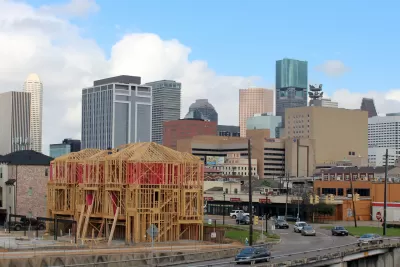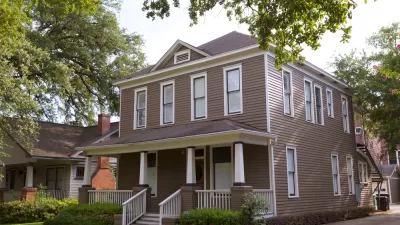A lawsuit argues that Houston's Historic Preservation Ordinance is a form of de facto land use control, equivalent to zoning, which isn't allowed by state and local laws.

Ryan Nickerson reports on a legal controversy that could decide the future of land use control in the U.S. city most famous for rejecting the most common form of land use controls.
A pair of local homeowners are attempting to make the legal case that the city of Houston's Historic Preservation Ordinance (HPO) constitutes a form of de facto zoning—a system of land use control that is ostensibly not allowed in the city.
"In a brief filed on behalf of Powell and Luccia on Sept. 8, Houston lawyer Matthew Festa said that Texas law does not support, 'a vague and unlimited power for local governments to regulate property rights without limitation,'" explains Nickerson.
Festa argues that the city's HPO "[limits] individual property rights to create restrictive historic zoning districts, ignoring the requirements set forth by the Texas Legislature and the people of Houston," according to the article.
Sara Bronin, Real Property Law professor at the University of Connecticut Law School and a land use reformer in the state of Connecticut, is quoted in the article saying that the legal argument presented by the plaintiffs is novel in the legal system. More on the history of the lawsuits against the HPO, and the history of the HPO, itself is included in the article.
FULL STORY: Heights homeowners take fight over preservation ordinance to state Supreme Court

Trump Administration Could Effectively End Housing Voucher Program
Federal officials are eyeing major cuts to the Section 8 program that helps millions of low-income households pay rent.

Planetizen Federal Action Tracker
A weekly monitor of how Trump’s orders and actions are impacting planners and planning in America.

Ken Jennings Launches Transit Web Series
The Jeopardy champ wants you to ride public transit.

Crime Continues to Drop on Philly, San Francisco Transit Systems
SEPTA and BART both saw significant declines in violent crime in the first quarter of 2025.

How South LA Green Spaces Power Community Health and Hope
Green spaces like South L.A. Wetlands Park are helping South Los Angeles residents promote healthy lifestyles, build community, and advocate for improvements that reflect local needs in historically underserved neighborhoods.

Sacramento Plans ‘Quick-Build’ Road Safety Projects
The city wants to accelerate small-scale safety improvements that use low-cost equipment to make an impact at dangerous intersections.
Urban Design for Planners 1: Software Tools
This six-course series explores essential urban design concepts using open source software and equips planners with the tools they need to participate fully in the urban design process.
Planning for Universal Design
Learn the tools for implementing Universal Design in planning regulations.
Heyer Gruel & Associates PA
Ada County Highway District
Institute for Housing and Urban Development Studies (IHS)
City of Grandview
Harvard GSD Executive Education
Toledo-Lucas County Plan Commissions
Salt Lake City
NYU Wagner Graduate School of Public Service





























